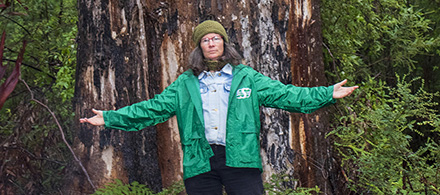It’s an understatement to say that CoVid-19 has disrupted the entire world. No country is immune. It is of course virulent, disruptive, debilitating and deadly. It is also a distraction. Source: Bruce Mitchell
Australia’s attention has been fixed on the daily press briefings detailing border closures, restrictions, infection rates, case numbers and, sadly, deaths, for months now.
Debate on almost everything but the virus has been shut down because state parliaments have been closed.
But, in the background and shrouded by the overwhelming effects of the virus, there is still activity.
The target is, again, the native timber industry. And the conservation lobby, which usually performs for and needs the mainstream media to highlight its campaigns, seems to have changed tactics.
Gone are some of the stunts that used to gain so much airtime.
In Northern NSW it has become a war of attrition. By constantly harassing logging companies, maybe they hope that companies will just want to give up through fatigue. There has already been a hint of that feeling among some loggers in East Gippsland.
And in Tasmania we have seen, but gladly not a repeat of, the recent spiking of trees headed for sawmills. No Green group claimed responsibility, no Green group decried it.
Western Australia is the latest case in point.
South West Greens MP Diane Evers yesterday introduced a Bill into State Parliament’s Upper House to end native logging in Western Australia and wind up the State-Government run Forest Products Commission with little or no attention paid by Perth’s mainstream media.
She told the House that under the Greens’ plan current timber contracts would be wound up as soon as practicable, noting their existing end dates are 2023 with the expiry of the current forest management plan.
“The south west and the rest of the state deserve a system of forest management that is capable of harnessing the entire value of our native forests through truly sustainable industries,” she said.
Can’t argue with that.
But to then suggest that “there are many new and emerging opportunities, such as ecotourism, honey and bee production…” shows just how unrealistic the conservation movement can be.
As the Forest Industries Federation of WA pointed out honey and bee production portrayed an unlikely scenario, given that under the plan native forests would become national parks, and it is currently illegal to place hives in WA national parks.
At the end of the day, the Greens’ Bill is a stunt. Word from WA is that it will not be passed. Ms Evers has possibly established a base camp from which to mount further campaigns.
And there is no hope the Greens will give up after the Bill is defeated.
But it is another distraction at a time when the world is distracted enough.
Maybe the Greens’ should be taking more notice of the Harvard Forest Long-Term Ecological Research’s recent study on climate change and forestry.
Harvard Forest is an ecological research area of 3000 acres owned and managed by Harvard University and located in Petersham, Massachusetts. The property, in operation since 1907, includes one of North America’s oldest managed forests, educational and research facilities, a museum, and recreation trails.
The study, published in Ecological Monographs, reveals that the rate at which carbon is captured from the atmosphere at Harvard Forest nearly doubled between 1992 and 2015.
Trees have also been growing faster due to regional increases in precipitation and atmospheric carbon dioxide, while decreases in atmospheric pollutants such as ozone, sulphur, and nitrogen have reduced forest stress.
The volume of data brought together for the analysis by two dozen scientists from 11 institutions, is unprecedented as is the consistency of the results.
It’s the sort of science the environmental sector doesn’t want to read, or believe in.
For those in the timber industry it is powerful reading.






